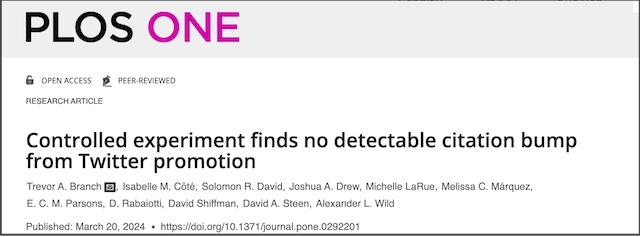Clik here to view.

Earlier this month, a group of scientists from universities around the world published the results of an ingeniously simple experiment in the journal PLoS ONE. Every month, for ten months, they randomly selected an article from a journal in their field to promote on their Twitter accounts, which, collectively, added up to around 230,000 followers. They then later compared the success of these tweeted articles with control articles randomly selected from the same issues.
The result? No statistically significant increase in citations in the promoted articles versus the controls. There was a difference, however, in the download numbers: more people took a look at the tweeted citations.
In this narrow look at social media and science a more general lesson about this technology emerges. Maintaining an aggressive presence in these online spaces can increase the number of people who temporarily encounter you or your work. But these encounters are often ephemeral, rarely leading to more serious engagement. It’s exciting to receive increased attention in the present, but it may have little effect on your impact in the future.
Book authors understand this lesson. It’s valuable, for example, for me to do a long-form podcast interview about my book, or to tell my long-time readers on this newsletter about it (ahem, see below). These activities are the equivalent of a professor giving a talk about their paper at an academic conference or posting an announcement in a relevant publication.
At the same time, more than a few authors have learned in recent years that large numbers of TikTok, or Twitter, or YouTube subscribers do not always amount to much in terms of sustained sales. The relationships with these social media audiences is different: less trust, more antsy energy; exciting, but shallow.
Content platforms that compensate your energies largely with the ego-boosting embrace of digital attention can be compelling and fun. They can also be useful for seeking out feedback or new connections (see my recent conversation with Adam Grant for a nice discussion of this point.) But don’t mistake them as somehow vital to your goal of finding a serious audience for your deepest efforts.
#####
Speaking of deep efforts, I have two quick administrative notes…
- As part of a major article that I’m writing, I’m looking to hear from college students who have used tools like ChatGPT to help them write class paper assignments. If this describes you, please send me an email at author@calnewport.com with the subject “ChatGPT Writing.” You can assume the contents of your email will be confidential and off-the-record.
- My book Slow Productivity continues to chug along. It’s now spent its first three weeks on the Amazon Charts! If you have not yet bought the book, please consider doing so! (You can learn more here, or find it wherever books are sold.)
The post Can You Tweet Your Way to Impact? appeared first on Cal Newport.
